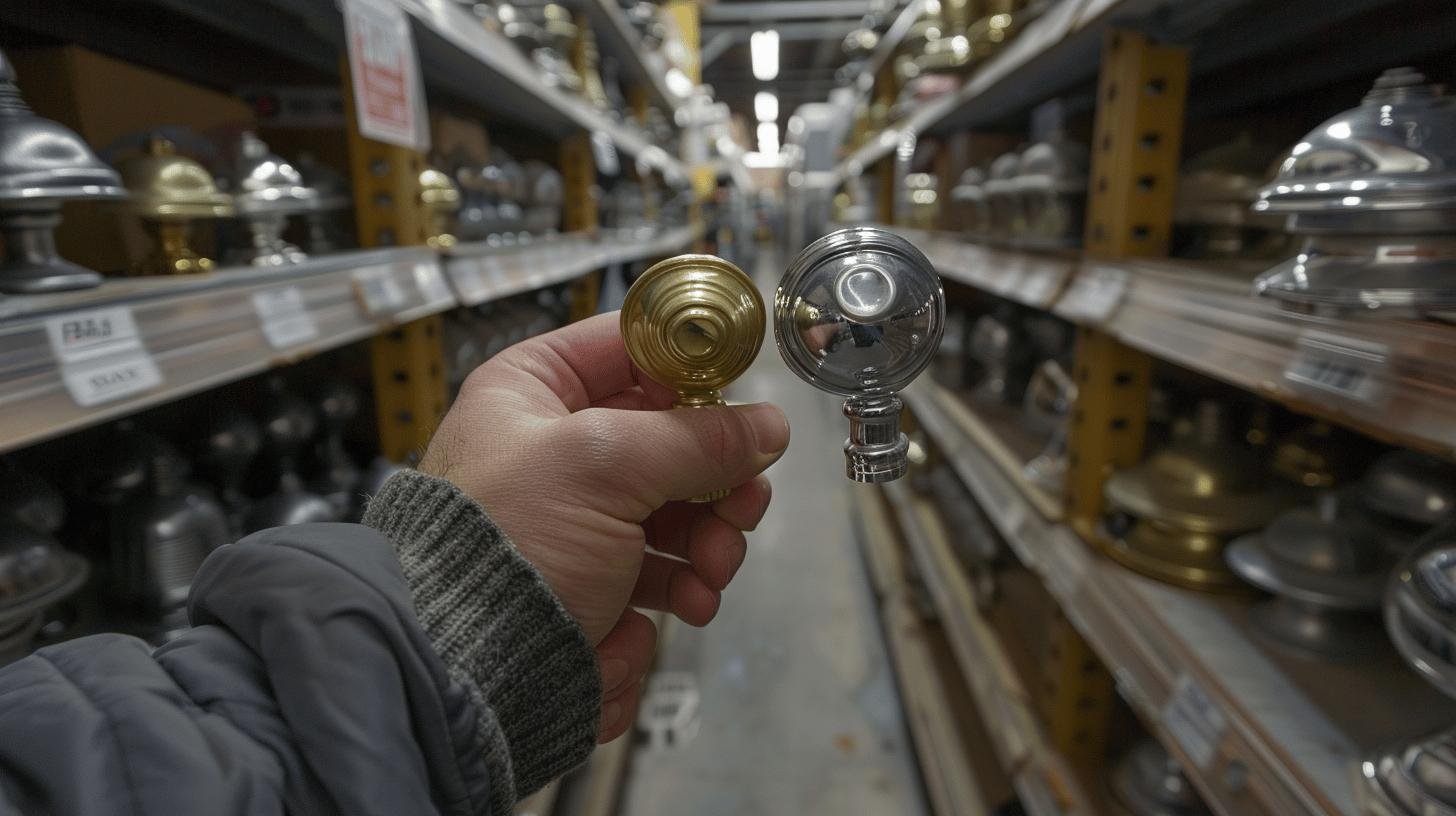Are you overwhelmed by the number of door hardware suppliers available, each boasting exceptional offerings? Choosing the right supplier can significantly impact the success of your home improvement projects. This decision isn’t just about finding high-quality products—it’s about evaluating a supplier’s entire offering. From product variety and competitive pricing to quality assurances and reliable customer support, every aspect matters. With this guide, you’ll uncover the secrets to making an informed choice to ensure your projects run smoothly and efficiently. Ready to discover how to select the perfect partner for your hardware needs? Let’s dive in.
Understanding Supplier Evaluation Criteria for Door Hardware
Evaluating the variety of products offered by door hardware suppliers is crucial for meeting diverse customer needs. A comprehensive range of products, including door handles, locks, hinges, and electronic locks, ensures that a supplier can accommodate various architectural styles and security requirements. When a supplier offers a wide selection, clients have the flexibility to choose products that match the aesthetic and functional demands of their projects. Precision in product variety assessment involves verifying that the supplier’s offerings align with current market trends and customer preferences, allowing for tailored solutions across different applications.
Competitive pricing is a significant factor when selecting a door hardware wholesale supplier. Price points should be evaluated to ensure they offer advantageous rates for bulk purchases, which can directly impact project budgets and profitability. Suppliers who provide transparent pricing structures and volume discounts make it easier for businesses to plan their expenditures and achieve cost savings. High precision in assessing pricing involves comparing multiple suppliers and considering factors like shipping costs and potential hidden fees, ensuring that the total cost aligns with financial expectations.
Quality assurances such as warranties and certifications play an essential role in evaluating the reliability of door hardware products. These assurances serve as indicators of a supplier’s commitment to maintaining high standards in manufacturing and product performance. When choosing a supplier, it is crucial to verify the presence of industry-standard certifications and comprehensive warranty policies that cover defects and performance issues. Precision in assessing quality assurances involves scrutinizing the terms and conditions of warranties and verifying the validity of certifications to ensure long-term satisfaction and reliability.
Product variety (door handles, locks, hinges, electronic locks)
Competitive pricing
Quality assurances (warranties, certifications)
Comparing Delivery and Customer Support Among Suppliers

Reliable delivery timelines are crucial when selecting a wholesale door hardware supplier, as delayed shipments can lead to significant project setbacks. What criteria should be used to evaluate delivery timelines? Precision in this evaluation involves examining the supplier’s track record for meeting promised delivery dates and understanding their logistics capabilities. Suppliers who consistently deliver on time help maintain project schedules, preventing costly delays and ensuring timely completion of construction or renovation projects. Understanding the supplier’s shipping policies and potential disruptions, such as holidays or supply chain challenges, is essential for accurate planning.
Customer support plays a vital role in resolving post-purchase issues, impacting the overall satisfaction with a supplier. How does customer support quality affect supplier selection? High precision in this area requires assessing the responsiveness and effectiveness of the supplier’s support team in addressing concerns, such as product defects or installation difficulties. A dedicated and accessible customer support service can quickly resolve issues, minimizing disruptions and maintaining project momentum. Evaluating factors like availability, communication channels, and the presence of after-sales services can determine the level of support provided by a supplier.
| Supplier | Delivery Timelines | Customer Support Quality |
|---|---|---|
| Supplier A | Consistent | Excellent |
| Supplier B | Variable | Moderate |
| Supplier C | Delayed | Poor |
Assessing Supplier Reputation and Reliability
In the process of selecting door hardware wholesale suppliers, a strong reputation within the industry serves as a vital indicator of trustworthiness and quality. How important is a supplier’s reputation? Precision in assessing reputation is high; it reflects the supplier’s history of consistent service, product quality, and ability to meet customer expectations. Suppliers with well-established reputations have typically demonstrated reliability over time, making them preferable choices for businesses seeking dependable partners.
Third-party reviews are crucial for gaining insights into a supplier’s credibility. Why are third-party reviews important? The precision is high since these reviews provide unbiased feedback from previous customers and industry experts. They allow potential buyers to evaluate the experiences of other clients, highlighting both positive aspects and potential red flags associated with a supplier’s service. Analyzing a broad range of reviews helps in forming a comprehensive view of a supplier’s performance and reliability.
Supplier stability is a critical factor for ensuring long-term partnerships. What makes supplier stability significant? Precision is high because stable suppliers are likely to continue meeting contractual obligations and maintaining product availability. Assessing the financial health, market presence, and operational history of a supplier provides valuable information about their ability to sustain business operations over time. Stable suppliers offer the assurance of continuous support and product supply, which is essential for long-term business success.
Strong reputation
Positive third-party reviews
Supplier stability
Negotiating Terms with Door Hardware Suppliers

Negotiation plays a crucial role in securing favorable terms with door hardware wholesale suppliers, impacting the overall cost and quality of procurement. Why is negotiation important in supplier selection? Precision is high as it allows businesses to tailor agreements to better fit their specific needs, potentially lowering costs and improving service conditions. A well-negotiated deal can lead to advantageous pricing, flexible payment terms, and additional value-added services. This process involves understanding both parties’ interests and finding a mutually beneficial outcome, ensuring that the business relationship remains strong and productive.
Effective pricing strategies are essential for achieving cost-effective deals with suppliers. What strategies can be used to secure better pricing? The precision is high since strategies such as bulk purchasing, seasonal negotiation, and leveraging competitive quotes can significantly reduce expenses. Bulk purchasing often results in discounts due to economies of scale, while negotiating during off-peak seasons can take advantage of suppliers’ willingness to reduce prices to maintain sales volume. Additionally, presenting competitive quotes from other suppliers can serve as leverage to negotiate better terms. These strategies require careful planning and analysis to optimize the financial benefits of supplier agreements.
Achieving successful outcomes in negotiations requires a strategic approach and thorough preparation. How can businesses ensure successful negotiations? Precision is high as businesses must be well-prepared, setting clear objectives and understanding their bargaining position. Identifying key negotiation points, such as delivery schedules, payment terms, and quality guarantees, establishes a framework for discussion. Emphasizing long-term benefits, such as continuous supply or exclusive product offers, can foster a collaborative relationship. Successful negotiations depend on clear communication, mutual respect, and a willingness to adapt, resulting in agreements that support sustainable business growth.
- Research market prices
- Prepare negotiation points
- Focus on long-term benefits
Importance of Quality and Material in Door Hardware Selection
Selecting high-quality materials for door hardware is crucial for ensuring durability and long-lasting performance. Why is material quality important in door hardware? The precision in this assessment is high, as materials like brass, stainless steel, and forged iron offer superior resistance to wear and corrosion compared to less robust options like plastic or pot metal. These materials are known for maintaining their structural integrity under frequent use, providing reliable functionality over time. Investing in high-quality materials translates to reduced maintenance costs and fewer replacements, thereby enhancing the overall value of the hardware investment.
The construction methods employed in manufacturing door hardware significantly influence product longevity. How do construction methods affect the lifespan of door hardware? Precision is high when examining techniques such as precision casting, forging, and advanced machining, as they enhance the mechanical properties and strength of the components. These methods ensure that each part is crafted to meet exact specifications, reducing the likelihood of operational failures. Proper assembly and finishing processes further contribute to the longevity by protecting against environmental factors and mechanical stress. By prioritizing meticulous construction methods, manufacturers can produce hardware that withstands rigorous usage over extended periods.
| Material | Durability | Longevity |
|---|---|---|
| Brass | High | Long |
| Stainless Steel | Very High | Very Long |
| Forged Iron | High | Long |
Exploring Product Variety and Customization Options

Why is it important to have a wide variety of door hardware products available from suppliers? High precision in this evaluation reveals that a diverse product range allows for flexibility in design and functionality, accommodating various architectural styles and personal preferences. Suppliers offering a broad selection, such as different types of handles, locks, and hinges, enable clients to find exact matches for their specific project needs, whether for residential renovations or commercial installations. This adaptability ensures that the hardware not only meets practical requirements but also aligns with aesthetic goals.
What are the advantages of customization in door hardware? High precision shows that customization options provide tailored solutions for unique project specifications, enhancing both the utility and appeal of hardware installations. Customization allows for modifications in dimensions, materials, and finishes, ensuring that the end product fits seamlessly into its intended environment. This level of personalization can address specific functional requirements, such as accessibility features or security enhancements, while also offering unique design elements that reflect the client’s vision.
Common customization options offered by suppliers include choices in materials and finishes, allowing for personalization that enhances the overall look and feel of the hardware. Examples include selecting from wooden door handles for a classic touch or opting for glass door locks for a modern appeal. Suppliers may also offer custom finishes, enabling clients to choose colors and textures that complement their decor. These options provide the opportunity to create cohesive and distinct designs that stand out.
- Wooden door handles
- Glass door locks
- Custom finishes
Final Words
Evaluating door hardware wholesale suppliers involves a thorough assessment of critical factors. From understanding the breadth of product offerings, including door handles, locks, and electronic options, to ensuring competitive pricing and quality assurances, each aspect plays a role in selection. Reliable delivery timelines and robust customer support are equally important for maintaining project schedules and resolving issues efficiently. Assessing supplier reputation and stability ensures trustworthy partnerships. Mastering negotiation tactics and focusing on quality materials further aids in making informed decisions. These strategies help in choosing the right supplier tailored to your project’s needs.
FAQ
Q: How to choose between different door hardware wholesale suppliers in the USA?
A: Selecting door hardware suppliers involves evaluating product variety, price points for bulk purchases, and quality assurances such as warranties and certifications.
Q: What are common types of door hardware functions?
A: Door hardware typically includes locks, handles, knobs, and hinges, each serving specific security and functional roles like entry, privacy, or passage.
Q: What are the levels of door hardware?
A: Door hardware levels generally refer to the grade ratings and security features, which determine their durability and application, such as residential or commercial use.
Q: How can you match door hardware?
A: Matching door hardware involves choosing consistent styles, finishes, and colors that complement the overall design and function of the space.
Q: Who makes the highest quality door hardware?
A: Brands like Schlage, Emtek, Kwikset, Assa Abloy, dormakaba, and Yale are known for producing high-quality door hardware, offering reliability and design options.
Q: What are considerations in the selection of door hardware?
A: Key considerations include material durability, functionality, aesthetic compatibility, security requirements, and the reputation of the hardware manufacturer.
Q: What is the best place to buy door handles in bulk?
A: Bulk purchases of door handles can be made through wholesale suppliers or specialized retailers that offer competitive pricing and a wide range of options.





